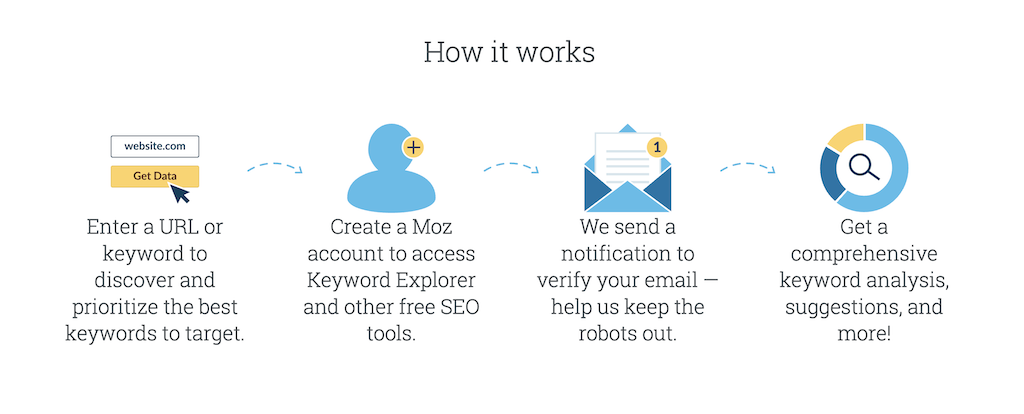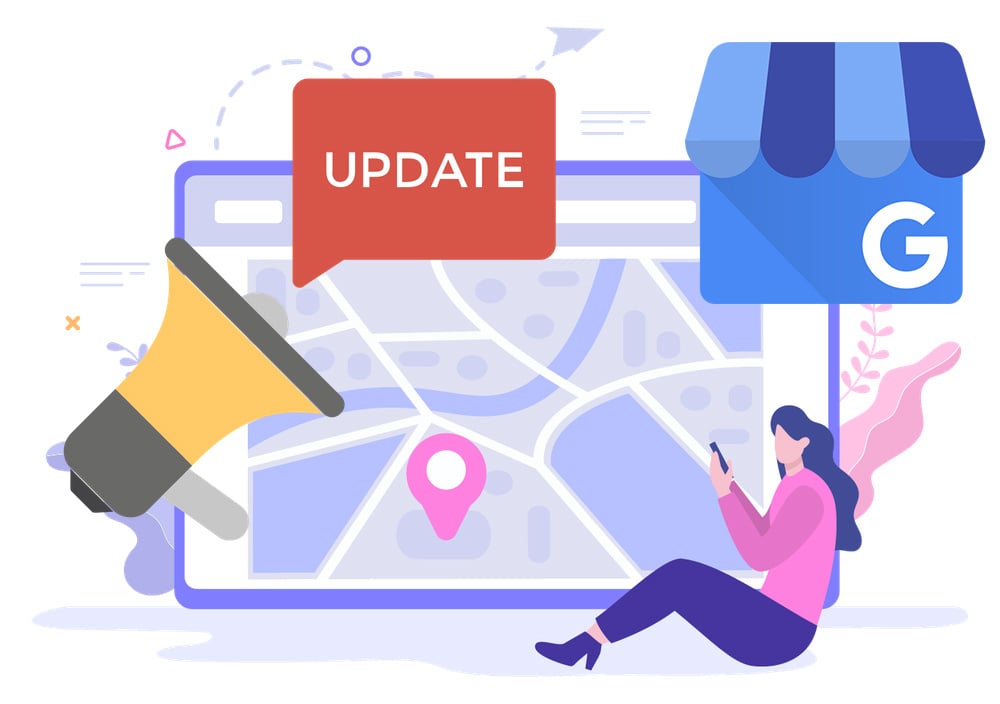Finding the Right Words: Simple Keyword Tips for Your Landscaping Business
Read on for more.

If you own a landscaping business, you know how crucial it is to stand out online to draw in new clients. A key strategy for enhancing your service business online presence is through effective keyword research.
This process entails discovering the terms and phrases potential customers use when looking for landscaping services nearby. Integrating these specific keywords into your website's content boosts your visibility in search engine rankings, leading to increased website traffic and more customer inquiries.
Exploring Local Keyword Research for Your Landscaping Business: A Simple Guide
What Exactly is a Keyword?
Think of a "keyword" as just that: a key term or phrase that helps search engines like Google understand and categorize your website. But don't be misled by the term "keyword" – it doesn't have to be a single word.
For instance, "landscaping" could be a keyword, but so could "residential lawn care services in denver colorado." These more specific phrases are known as "long-tail keywords."
Overall, the better and more relevant the keywords you include on your website, the higher your site will rank when local customers search for your landscaping services.
What is Keyword Research?
Simply put, keyword research is the process of identifying the terms and phrases people enter into search engines when looking for the landscaping services you offer in their vicinity.
How Do You Conduct Local Keyword Research?
Starting local keyword research can be straightforward. You can begin by Googling your service offerings and examining the resulting search queries and suggestions. Features like Google’s “people also ask” and “related searches” are great for gaining insights without much effort.
However, more thorough research requires digging deeper, which we will cover in this guide.
How is Keyword Research for My Cleaning Business Going to Be Different from Any Other Service Business?
While the basic approach to local keyword research is consistent across different service industries, as a landscaping business, the keywords you focus on will differ based on your specific services and location.
Is There a Cost to Doing Keyword Research?
You might think keyword research entails significant expenses, but actually, a lot of effective research can be done for free. Of course, there are paid tools available, but they are not mandatory to get started.
The Value of Keyword Research for Your Landscaping Business
Understanding the wants and needs of your potential clients is essential for any local landscaping company, and keyword research is a powerful tool in this quest. Typically, when individuals look for landscaping services online, they use specific phrases that reflect their immediate needs, such as "lawn care," "garden design," or "tree planting."
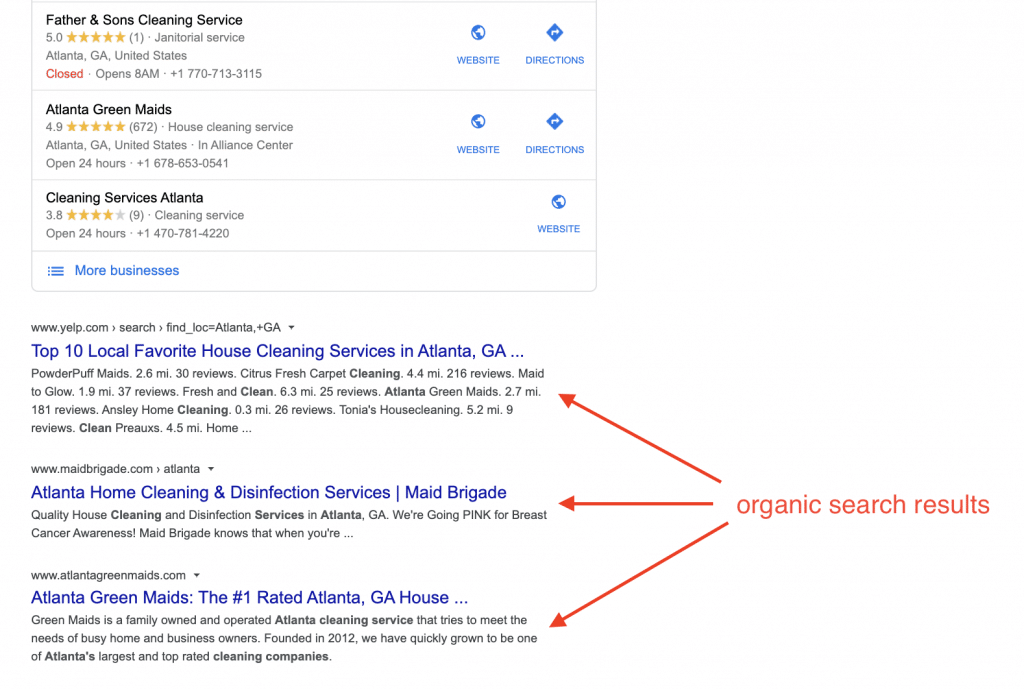 Image Source: ZenMaid Magazine
Image Source: ZenMaid Magazine
Engaging in keyword research allows you to uncover these vital terms. By aligning your website's content with the phrases your prospective clients use, you enhance the likelihood of your site appearing in their search results, thereby drawing in more relevant inquiries.
Furthermore, keyword research is a cornerstone of effective local SEO. Google and other search engines give precedence to sites that are finely tuned to local search terms when users look for landscaping services nearby.
Adding pertinent local keywords throughout your website's content, in the meta tags, and within page titles not only boosts your rankings in these local search results but also extends your reach to potential clients in your area.
Grasping Your Audience's Needs and Search Goals in Landscaping
Before you leap into keyword research, it's crucial to grasp who your target audience is and what they're looking for.
Imagine their perspective: what terms might they type into a search engine while seeking landscaping services? Are they in need of general yard maintenance, or are they looking for specialized services like landscape design or seasonal yard clean-up? Do they require regular landscaping work or just a one-off project?
Understanding the intent behind their searches enables you to pinpoint the keywords most likely to draw in the ideal customers for your landscaping business. Additionally, studying your competitors can provide further clarity.
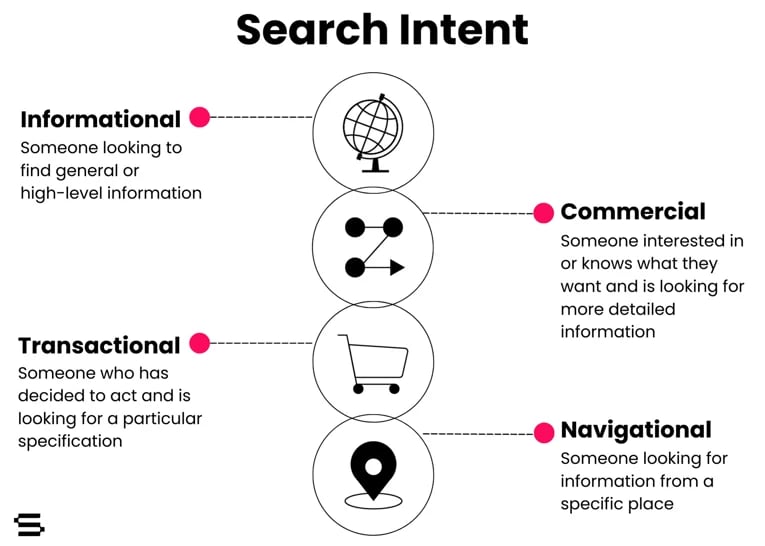 Image Source: Seer Interactive
Image Source: Seer Interactive
Examine the keywords featured on their websites and the variety of services they promote. This analysis can shed light on which keywords resonate most in your locality, assisting you in fine-tuning your keyword approach for your landscaping services.
Implementing Local Keyword Research for Your Landscaping Business, Even with SEO Help (SEO or Web Agency)
If digital marketing isn't your forte, it's advisable to collaborate with a specialist who can construct your site and fine-tune it using the right keywords. Often, your website developer might conduct some preliminary keyword research for you.
However, it remains crucial for you to communicate with your web or SEO team regarding the specific keywords you believe are most relevant to your business.
Crafting Relevant Keywords from Your Services
Every service you offer can be considered a potential keyword. Yes, that's correct.
By naming your services with phrases that resonate with your clients and potential leads, such as "seasonal garden cleanup" or "residential landscape design," you effectively create valuable keywords.
Localizing Your Keywords
Incorporating your location into your keywords is equally important. Add cities, neighborhoods, and specific areas to the services you offer. For instance, if your landscaping business is based in Portland, Oregon, you might use "residential landscaping services pearl district portland" as a keyword on your site. This strategy can significantly enhance your local search visibility.
Undertaking Local Keyword Research for Your Landscaping Business (Do-It-Yourself Local SEO Tips)
With a solid grasp of your target audience and their search motives, you're ready to delve into local keyword research for your landscaping business. Although managing local SEO solo is not typically recommended without digital marketing proficiency, there are accessible tools and resources that can aid in this endeavor.
Free Tools for Local Keyword Discovery

Google Keyword Planner search volume on keyword "house cleaning greenville sc"
- Google Keyword Planner: This is a great starting point, offering the ability to input phrases associated with your landscaping services and view related data such as search volume and competition levels. It's instrumental for pinpointing high-traffic keywords to help enhance your website's reach.
- Moz Keyword Explorer: For more detailed keyword insights, Moz Keyword Explorer is an excellent choice. It provides comprehensive analyses and uncovers new keyword possibilities, along with data on how challenging certain keywords may be to rank for, assisting you in prioritizing your efforts.
How Moz Keyword Explorer Works
Utilizing Local Directories and Review Platforms (Also Free)
Beyond these tools, local directories and review websites can be gold mines of information. They often reflect the terms customers use when searching for landscaping services in your vicinity.
Examining local competitors through Google Maps can also be enlightening. Review the services they list and note the primary and secondary categories, as each represents potential keywords for your strategy.
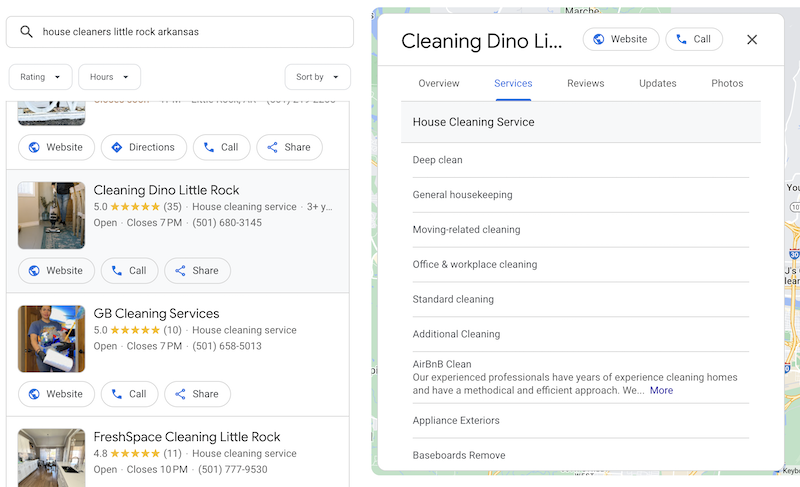
By leveraging these tools and resources, you can embark on effective local keyword research, tailoring your landscaping business's online content to meet the specific needs of your potential clients and improve your local search engine visibility.
Investing in Advanced Tools for Local Keyword Research in Landscaping
If you possess some digital marketing knowledge and can dedicate time to your landscaping business's SEO, considering a paid keyword research tool might be worthwhile. These advanced tools offer deeper insights and tailored keyword suggestions that align with your website's niche, industry, and local area.
Recommended Paid Keyword Research Tools
- KWFinder: Offers a blend of accessibility and depth, ideal for those new to SEO but seeking more than basic insights. While it does have a free tier, unlocking its full potential requires a subscription starting at around $29 per month.
- Jaaxy: Known for its user-friendly interface and efficient keyword data, Jaaxy allows up to 30 free searches, making it perfect for initial explorations. For continuous, in-depth research, plans begin at $49 monthly after the trial ends.
- Ubersuggest: Created by SEO guru Neil Patel, this tool is designed to provide practical keyword insights and strategies. Its free version offers limited daily searches, with full features available from $29 per month.
Advanced SEO Suites
For those deeply committed to maximizing their online presence, platforms like Moz, SEMRush, and Ahrefs are top choices. These tools are comprehensive, offering not just keyword research but also competitor analysis, site audits, and more. While more expensive—starting at approximately $99 monthly—these platforms can significantly enhance your local SEO efforts if utilized effectively.
Investing in these tools requires not just money but also time to learn and apply their features effectively. However, for a landscaping business aiming to dominate local search results, the investment can lead to valuable returns in increased visibility and customer engagement.
Crafting Engaging Content with Strategic Keywords for Your Landscaping Business Website
After pinpointing the keywords that resonate with your landscaping business and discovering those with significant search volumes, it's time to weave these keywords into your site's content thoughtfully.
Selecting Low-Competition, High-Volume Keywords
Utilize tools like Google Keyword Planner or any advanced platform to evaluate the competitive landscape of your chosen keywords. Aim for those with high search volumes but lower competition levels, indicating a demand for the topic with less online saturation.

Enhancing Your Main Website Pages
Begin with your homepage: integrate your main keyword into the page title, meta description, and header tags to clarify your site's focus for search engines, thereby boosting your ranking potential for that term.
Develop dedicated pages for each landscaping service you provide, using specific keywords for each. For instance, if your services include garden design, have a page specifically optimized for "garden design services" or "custom landscape creations." This specificity helps in targeting the right audience and providing them with detailed service information.
Write content that is natural and user-friendly, avoiding the overuse of keywords which can detract from the user experience and credibility. Your content should be informative, addressing your audience's questions and needs, thus positioning your business as a knowledgeable leader in the landscaping sector.
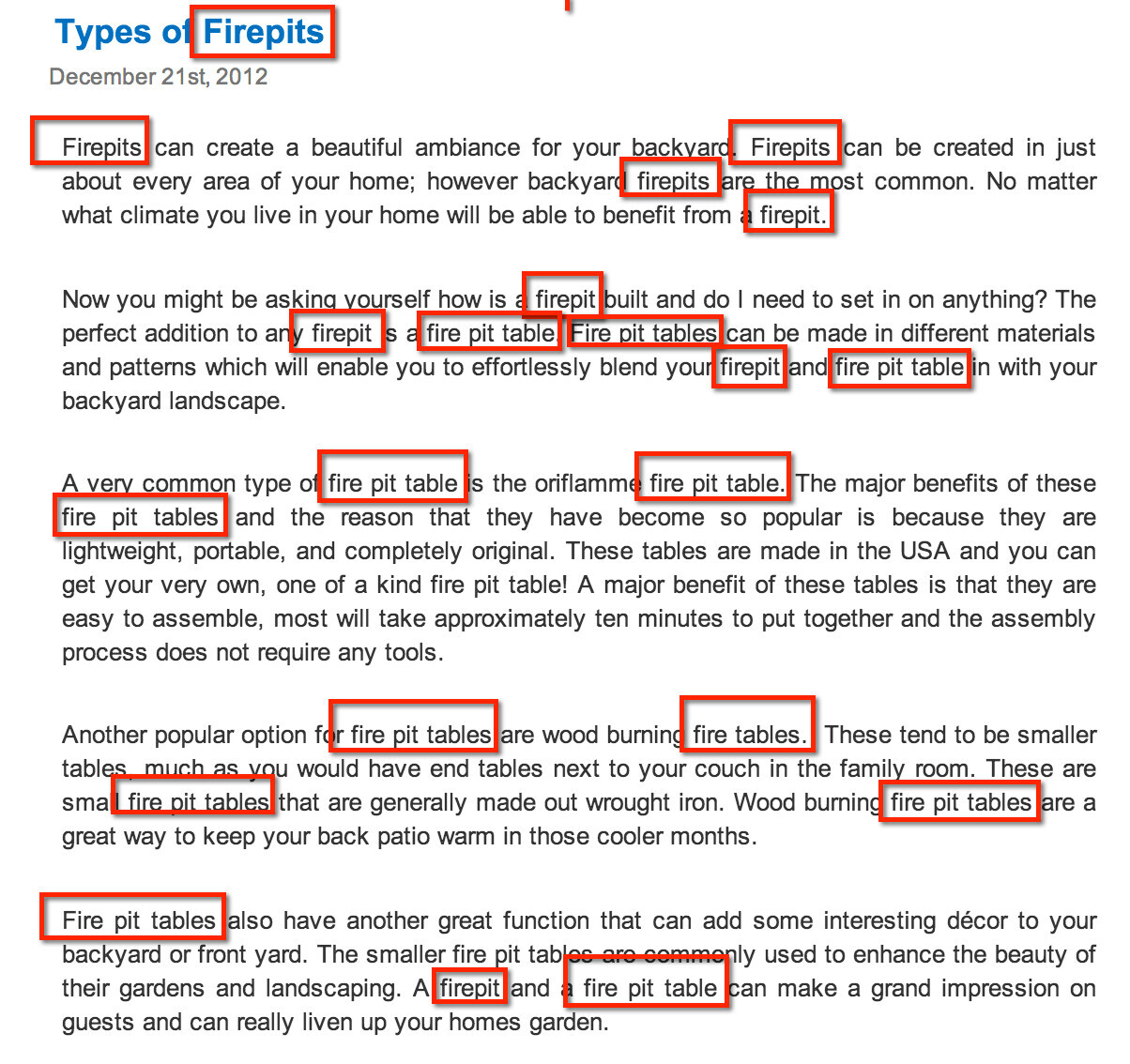 Example above demonstrates "keyword stuffing" which overuses keywords in a way that turns off web visitors and can negatively impact your SEO. (Image courtesy of SEMRush)
Example above demonstrates "keyword stuffing" which overuses keywords in a way that turns off web visitors and can negatively impact your SEO. (Image courtesy of SEMRush)
Blogging with a Purpose
Incorporate a blog on your site to target additional, varied keywords. Each post should explore a different aspect of landscaping, ensuring no repetition of focus keywords across your site's content. Employ long-tail keywords within your blog posts to cover more niche topics, which can attract specific segments of your audience and fill gaps in your content strategy.
By following these guidelines, you'll not only enhance your website's SEO performance but also provide valuable information to your potential customers, thereby nurturing trust and authority within your landscaping niche.
Conclusion and Key Insights for Enhancing Your Landscaping Business Through Keyword Research
In summary, the art of keyword research is crucial for elevating your landscaping business's online profile.
By gaining a deep understanding of your potential clients, engaging in thorough local keyword research, and integrating these keywords effectively into your website's content, you can significantly boost your search engine visibility, drawing in more targeted inquiries and customers. It's important to consistently track and evaluate the effectiveness of your keywords to discover new opportunities and refine your strategies over time.
Remember, keyword research is not a one-time task but a continual process of discovery and adaptation. Dedicate time to uncover the terms and phrases that will make your landscaping business resonate with online searchers. By embedding these carefully selected keywords into your content, you will see a marked improvement in your online reach and customer engagement.
Adopting a methodical approach to keyword research sets the foundation for a successful online presence and positions your landscaping business for growth and success in the competitive market.
%20(1)%20(1).png?width=340&name=Group%2012%20(2)%20(1)%20(1).png)


